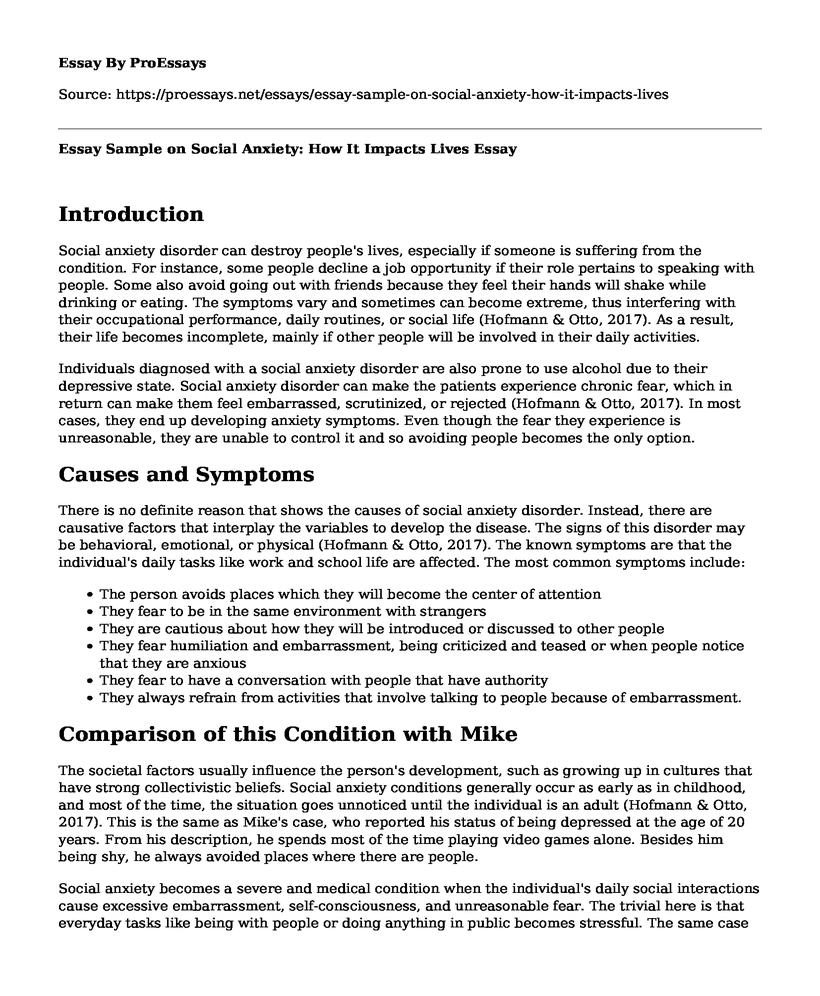Introduction
Social anxiety disorder can destroy people's lives, especially if someone is suffering from the condition. For instance, some people decline a job opportunity if their role pertains to speaking with people. Some also avoid going out with friends because they feel their hands will shake while drinking or eating. The symptoms vary and sometimes can become extreme, thus interfering with their occupational performance, daily routines, or social life (Hofmann & Otto, 2017). As a result, their life becomes incomplete, mainly if other people will be involved in their daily activities.
Individuals diagnosed with a social anxiety disorder are also prone to use alcohol due to their depressive state. Social anxiety disorder can make the patients experience chronic fear, which in return can make them feel embarrassed, scrutinized, or rejected (Hofmann & Otto, 2017). In most cases, they end up developing anxiety symptoms. Even though the fear they experience is unreasonable, they are unable to control it and so avoiding people becomes the only option.
Causes and Symptoms
There is no definite reason that shows the causes of social anxiety disorder. Instead, there are causative factors that interplay the variables to develop the disease. The signs of this disorder may be behavioral, emotional, or physical (Hofmann & Otto, 2017). The known symptoms are that the individual's daily tasks like work and school life are affected. The most common symptoms include:
- The person avoids places which they will become the center of attention
- They fear to be in the same environment with strangers
- They are cautious about how they will be introduced or discussed to other people
- They fear humiliation and embarrassment, being criticized and teased or when people notice that they are anxious
- They fear to have a conversation with people that have authority
- They always refrain from activities that involve talking to people because of embarrassment.
Comparison of this Condition with Mike
The societal factors usually influence the person's development, such as growing up in cultures that have strong collectivistic beliefs. Social anxiety conditions generally occur as early as in childhood, and most of the time, the situation goes unnoticed until the individual is an adult (Hofmann & Otto, 2017). This is the same as Mike's case, who reported his status of being depressed at the age of 20 years. From his description, he spends most of the time playing video games alone. Besides him being shy, he always avoided places where there are people.
Social anxiety becomes a severe and medical condition when the individual's daily social interactions cause excessive embarrassment, self-consciousness, and unreasonable fear. The trivial here is that everyday tasks like being with people or doing anything in public becomes stressful. The same case is observed with Mike, every time he has a conversation with anybody, he keeps on replaying the interactions to find out if he looked stupid while talking. Mike's condition has also reached a point where he ignores the phone calls of his friends, and also misses class because of the fear of adverse reactions.
Treatment
The treatment of this condition depends on how severe the physical and emotional status of the individual affects their daily activities (Hofmann & Otto, 2017). Treatment length also varies because some may respond to the treatment, while others need to be supported throughout their lives. In Mike's case, he needs both therapy and medication because, as described above, he has never mentioned to anyone what he feels until he is 20 years. Since his condition has never been discovered, the best treatment for Mike is a combination of therapy and medication and time to be supported until his condition disappears.
References
Hofmann, S. G., & Otto, M. W. (2017). Characterizing Social Anxiety Disorder. Cognitive Behavioral Therapy for Social Anxiety Disorder, 2(1), 1-23. doi: 10.4324/9781315617039-1
Cite this page
Essay Sample on Social Anxiety: How It Impacts Lives. (2023, May 22). Retrieved from https://proessays.net/essays/essay-sample-on-social-anxiety-how-it-impacts-lives
If you are the original author of this essay and no longer wish to have it published on the ProEssays website, please click below to request its removal:
- Paper Example on Organizational and Individual Stress Coping Strategies
- Vulnerability Stress-Adaptation Model Essay Example
- Essay Sample on Mental Illness in the Community
- Research Paper on the Difference in Social Groups
- Teens: More Stressed Than Ever Before? - Essay Sample
- Essay Example on Mental Illness: Challenges, Symptoms & Care Needed
- Response to the Article "Consecrated Counseling"







